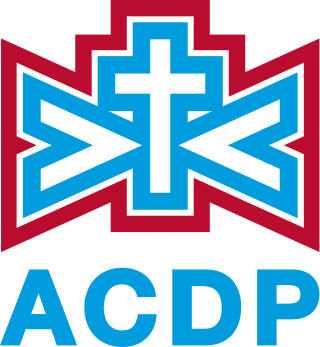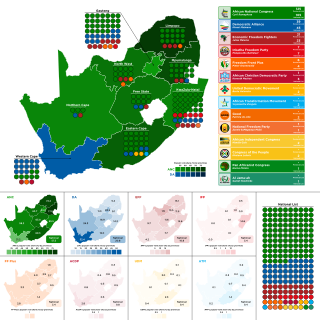Related Research Articles

The Inkatha Freedom Party is a conservative political party in South Africa, which is a part of the current South African government of national unity together with the African National Congress (ANC). Although registered as a national party, it has had only minor electoral success outside its home province of KwaZulu-Natal. Mangosuthu Buthelezi, who served as chief minister of KwaZulu during the Apartheid period, founded the party in 1975 and led it until 2019. He was succeeded as party president in 2019 by Velenkosini Hlabisa.

The Democratic Alliance is a South African political party which is a part of the current South African Government of National Unity (GNU) together with the African National Congress (ANC), Inkatha Freedom Party (IFP), and several others. The party has been the second-largest in South Africa since its foundation in 2000. The party is broadly centrist, and has been attributed both centre-left and centre-right policies. It is a member of Liberal International and the Africa Liberal Network. The DA traces its roots to the founding of the anti-apartheid Progressive Party in 1959, with many mergers and name changes between that time and the present. The DA has a variety of ideologically liberal tendencies, including neoliberalism, social liberalism, classical liberalism, and conservative liberalism.

The United Christian Democratic Party is a minor political party in South Africa. It was founded by Lucas Mangope, leader of the Bophuthatswana bantustan in 1997, as a successor to the Tswana National Party, and led by him for the first fifteen years of its existence. Mavis Matladi was elected as its leader on 29 January 2011 after the expulsion of Mangope. Matladi died in December 2011. Isaac Sipho Mfundisi was elected president on Saturday, 7 January 2012.

The African Christian Democratic Party (ACDP) is a South African political party founded in 1993. It is a conservative Christian party based on Biblical principles. The leader of the party is Kenneth Meshoe.

The Freedom Front Plus is a right-wing political party in South Africa that was formed in 1994. It is led by Pieter Groenewald. Since 2024, it is a part of the current South African government of national unity together with the African National Congress (ANC), the Democratic Alliance and other parties.

The United Democratic Movement (UDM) is a centre-left, social-democratic, South African political party, formed by a prominent former National Party leader, Roelf Meyer, a former African National Congress and Transkei homeland leader, General Bantu Holomisa, and a former ANC Executive Committee member, John Taylor. It has an anti-separatist, pro-diversity platform; and supports an individualist South Africa with a strong moral sense, in both social and economic senses.

General elections were held in South Africa on 22 April 2009 to elect members of the National Assembly and provincial legislatures. These were the fourth general elections held since the end of the apartheid era.

The Congress of the People (COPE) is a South African political party formed in 2008 by former members of the African National Congress (ANC). The party was founded by former ANC members Mosiuoa Lekota, Mbhazima Shilowa and Mluleki George to contest the 2009 general election. The party was announced following a national convention held in Sandton on 1 November 2008, and was founded at a congress held in Bloemfontein on 16 December 2008. The name echoes the 1955 Congress of the People at which the Freedom Charter was adopted by the ANC and other parties, a name strongly contested by the ANC in a legal move dismissed by the Pretoria High Court.

The Cape Independence Party (CAPEXIT), previously called the Cape Party, is a political party in South Africa which seeks to use all constitutional and legal means to bring about Cape independence, which includes the entire Western Cape, Northern Cape, six municipalities in the Eastern Cape, and one municipality in the Free State. The area includes all municipalities in those provinces with an Afrikaans-speaking majority. In 2009, it was claimed to have had a membership of approximately 1,000 people across South Africa, but official membership figures are not made public. The party currently holds two seats on the Cape Town City Council.

The National Party of South Africa (NP) also called the National Party or Nationalists or simply just Nats was a Right-Wing South African political party which competed for the Western Cape province in the 2009 provincial election and municipal council seats in the 2011 local government elections

General elections were held in South Africa on 7 May 2014, to elect a new National Assembly and new provincial legislatures in each province. It was the fifth election held in South Africa under conditions of universal adult suffrage since the end of the apartheid era in 1994, and also the first held since the death of Nelson Mandela. It was also the first time that South African expatriates were allowed to vote in a South African national election.

Agang South Africa is a South African political party, first announced by anti-apartheid activist Mamphela Ramphele on 18 February 2013, and founded on 22 June 2013, the date of the party's first official congress.

The Patriotic Alliance (PA) is a right-wing political party in South Africa, formed in November 2013 by, among others, businessmen Gayton McKenzie and Kenny Kunene. Since 2024, it is a part of the current South African government of national unity together with the African National Congress (ANC), the Democratic Alliance and other parties.
The 2016 South African municipal elections were held on 3 August 2016, to elect councils for all district, metropolitan and local municipalities in each of the country's nine provinces. It was the fifth municipal election held in South Africa since the end of apartheid in 1994; municipal elections are held every five years.

General elections were held in South Africa on 8 May 2019 to elect a new President, National Assembly and provincial legislatures in each province. These were the sixth elections held since the end of apartheid in 1994 and determined who would become the next President of South Africa.

The Better Residents Association is a minor South African political party formed by disgruntled African National Congress members in 2011. Initially formed as the Bushbuckridge Residents Association, the party changed its name in order to contest elections in all provinces.
The council of the City of Cape Town in the Western Cape, South Africa is elected every five years by a system of mixed-member proportional representation. Half of the councillors are elected by first-past-the-post voting from individual wards, while the other half are appointed from party lists so that the total number of party representatives is proportional to the number of votes received. By-elections are held to replace the councillors elected by wards if a vacancy occurs.

Good is a South African political party that was formed in December 2018. It is led by its founder Patricia de Lille, current Minister of Tourism and former mayor of Cape Town, who is also the party's sole member in the National Assembly. The party's stronghold is the Western Cape and mainly draws support from the Coloured community.

The Electoral Commission of South Africa (IEC) announced on 20 March 2019 that a record number of 48 parties had registered candidates for the national parliamentary election. This is 19 more parties that contested the 2014 national elections. In the provincial legislature elections, the total number of parties registering candidates were:
The Bitou Local Municipality council consists of thirteen members elected by mixed-member proportional representation. Seven councillors are elected by first-past-the-post voting in seven wards, while the remaining six are chosen from party lists so that the total number of party representatives is proportional to the number of votes received. In the election of 18 May 2011 no party obtained a majority; the Democratic Alliance (DA) and the African National Congress (ANC) won six seats each, with the remaining seat going to the Congress of the People (COPE). The DA and COPE formed a coalition to govern the municipality.
References
- ↑ "Newly launched party aims to do well in elections | SA Mzansi News". Archived from the original on 1 February 2014. Retrieved 25 January 2014.
- 1 2 "New party forms from COPE split | DispatchOnline". Archived from the original on 2 February 2014. Retrieved 25 January 2014.
- ↑ "Electoral Commission : News Article". www.elections.org.za. Retrieved 13 October 2021.
- ↑ Paul Berkowitz (30 January 2014). "January by-elections: The DA's pain is the ANC's gain". Daily Maverick. Retrieved 8 February 2014.
- 1 2 "2014 National and Provincial Elections Results – 2014 National and Provincial Election Results". IEC. Retrieved 11 May 2014.
